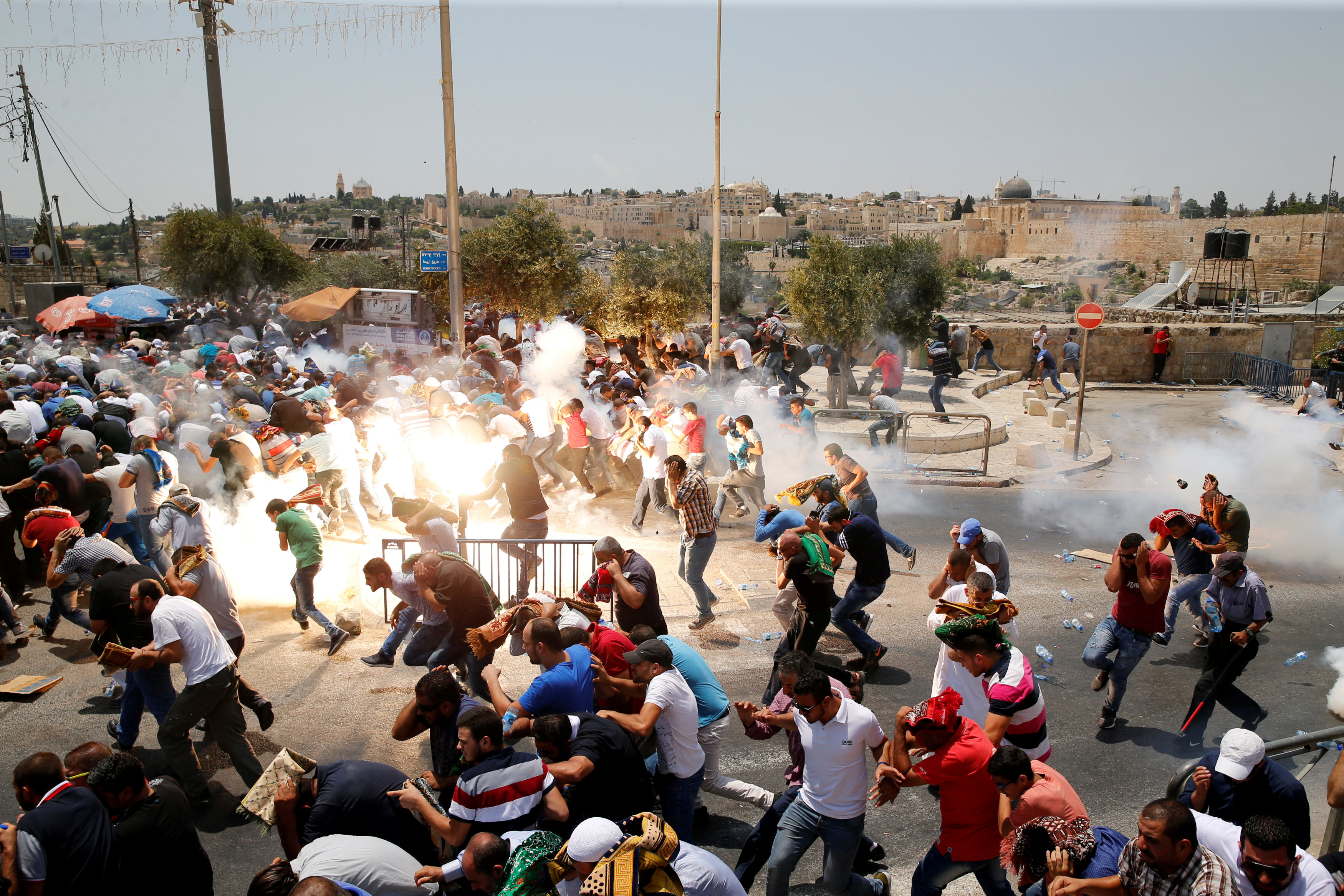 Palestinians react following tear gas that was shot by Israeli forces after Friday prayer on a street outside Jerusalem’s Old city July 21, 2017. REUTERS/Ammar Awad
Palestinians react following tear gas that was shot by Israeli forces after Friday prayer on a street outside Jerusalem’s Old city July 21, 2017. REUTERS/Ammar Awad US
RAND’s Doug Irving analyzes the results of a report on what the US gains financially from its overseas security commitments:
They found clear evidence that those overseas commitments do indeed strengthen trade between America and other countries, likely worth tens of billions of dollars every year. In fact, they estimated that doubling the number of treaties could expand U.S. trade, especially imports, by 34 percent. Doubling troop numbers would increase trade by up to 15 percent.
Stephen Wertheim takes a look at Trump’s plan to save western civilization:
All this makes President Trump something other than either the narrow realist that his critics fear or the passing oddity for which his critics hope. Like it or not, the emerging Trump doctrine has deep roots in American tradition. Six months in, the time has come for advocates of American world leadership to own up to a fact: Donald Trump is one of you.
Israel
Ron Ben Yishai examines the explosive situation following the Temple Mount crisis:
Admittedly, the murderers got what they wanted. They created an explosive chain of events that blew up in our faces, just like they had planned. The Israeli government wasn’t wise enough to try to reach a compromise with the Jordanians, the Waqf and the Palestinian Authority, which could have neutralized this explosive charge. Prime Minister Benjamin Netanyahu preferred to preach to Europe’s leaders, the Israeli public was busy with the submarine affair, and the foretold explosion at the Temple Mount was left to the police, as if it were a local Jerusalem event, while the Shin Bet and IDF warned that placing metal detectors on the Temple Mount under the current circumstances would be interpreted as a violation of the status quo.
Mazal Mualem presents the enigma of Avi Gabbai, the new contender for the PM position:
After the surprising election of a man who never voted for the party and joined it only eight months ago, Gabbay is in many ways an enigma — to Knesset members from the party, its veteran activists and party operatives, who have all known each other for many years. Most of them are unfamiliar with his style of management, his character, his opinions, his temperament or even his political identity.
Middle East
Aymenn al Tamimi discusses the myth of ISIS’ strategic brilliance:
But it’s a mistake to impute strategic brilliance to ISIS rather than acknowledging that it is an entity run by humans capable of grave errors. Otherwise, we risk becoming inadvertent propagandists for the group.
Kamran Bokhari writes about the lack of Sunni leadership at the moment:
There is no Sunni Arab center of gravity. Saudi Arabia, the wealthiest player, is trying to offer leadership. But its source of power is being drained every day that the price of oil, the lifeblood of its economy, is low. Even if that was not the case, the Saudis have historically relied on the United States to guarantee their national security. How could they provide for regional security and protect Sunni Arab interests if they cannot protect themselves? The Saudi-led war in Yemen is a prominent example of Riyadh’s inability to impose order in its own backyard. But perhaps the most glaring example is Qatar, a tiny Gulf Arab state that refuses to subordinate itself to Saudi Arabia’s strategy for the region.
Jewish World
Noa Gutow Ellis reports on a new Holocaust museum in Brooklyn, aimed at Ultra-Orthodox Jews:
To some, the Holocaust is the defining event of modern Jewish history; there are people like the Jewish-studies teacher at my former day school who said the purpose of taking students to the U.S. Holocaust Memorial Museum is “Jewish identity-building.” But then there are people for whom the Holocaust is just one instance of persecution in a long history of similar events—like Gordon, program coordinator at Amud Aish, who said to me: “The Holocaust is not my Judaism.”
Harvard Professor Jon Levenson, in a response to Mosaic Magazine’s monthly essay, tries to explain the biases in the world of Bible criticism:
At least in the American context, the political situation on campus at the moment adds more fuel to the distaste for traditional Christian positions, and sometimes Jewish ones as well. That academics, and elite academics all the more so, lean strongly to the left on politics has been true for some time. So has the disproportionate rate of secularity among professors.























 More news and opinions than at a Shabbat dinner, right in your inbox.
More news and opinions than at a Shabbat dinner, right in your inbox.